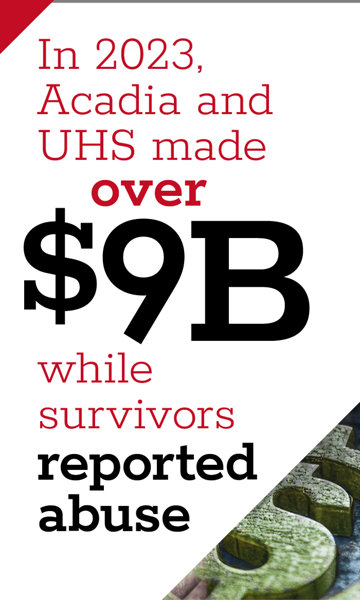What does the government have to do to make corporate giants Acadia Healthcare and Universal Health Services (UHS) stop running their Georgia “mental health” treatment centers as breeding grounds for allegations of sexual assault and serial abuse?
Acadia has already been forced to pay a $19.85 million settlement and UHS a whopping $122 million for fraudulent billing and various other violations—but did anything change?
Obviously not. Despite these massive punishments, three—count ’em, THREE—new lawsuits charging sexual assault have been filed against the two mega-landlords of the so-called “mental health” realm.
“I don’t think anyone is going to stand up and make an argument that Georgia’s mental health care system serves children well.”
Lawsuits against Riverwoods, owned by Acadia, and Peachford, a UHS hospital, also allege that Acadia and UHS both prioritize profit over providing adequate and safe health care for their underage patients, and ignore the damage being done to them by various depraved sickos in their facilities.
A man, 22, alleges he was raped by two male patients at Riverwoods when he was approximately 15 years old, and a 20-year-old woman says she was assaulted by a female staff member at Peachford when she was 17, and made to undergo a strip search when the assault happened.
The third lawsuit was filed by a man who says a roommate and a male employee sexually assaulted him at Peachford when he was a teen.
Attorney Amble Johnson said his clients “want to change the culture of profits over patients at these providers’ facilities, protect children from future abuse … and encourage other survivors of childhood sexual abuse to do the same.”

Several more similar lawsuits are to be filed over the next few weeks, the attorney stated.
“I don’t think anyone is going to stand up and make an argument that Georgia’s mental health care system serves children well,” State Representative Mary Margaret Oliver said. “The question is, what is going to be our response?”
Indeed, there are two questions: what and when?
Authorities have certainly had plenty of time to do something about it. One of the lawsuits states: “The pervasive and persistent abuse at UHS facilities has been publicly reported for years.”
And yet, it goes on.
In a Senate investigative report from 2024, entitled “Warehouses of Neglect: How Taxpayers Are Funding Systemic Abuse in Youth Residential Treatment Facilities (RTFs),” it was revealed that Acadia was valued at $6.5 billion, while UHS is valued at $11.8 billion.
Acadia boasts of having “262 behavioral health locations in 39 states and Puerto Rico,” while UHS says it has over 330.
It’s said that the healthcare business is aimed at “doing good,” but, apparently, Acadia and UHS are happily doing quite well—even without the “good.”
Is it any wonder that legal settlements in the mere millions don’t much bother these guys? To them, it’s chump change. Like drug dealers losing shipments that are discovered and confiscated, or being sent to prison, it’s seen as just the cost of doing business.
The Senate report notes, “Horrific instances of sexual abuse persist unremediated inside RTFs.”
Acadia and UHS were among the four RTF providers that the Senate Finance Committee investigated. Their review “revealed that children in these facilities are regularly subjected to physical, sexual and verbal abuse; inappropriate restraints and seclusions; unsafe and unsanitary conditions; and lack of necessary behavioral health care.”
The committee’s chairman, Senator Ron Wyden, stated: “It’s clear that the operating model for these facilities is to warehouse as many kids as possible while keeping costs low in order to maximize profits. Too often, abuse and neglect is the norm at these facilities and they’re set up to let this happen.”
Further, the report states: “The risk of harm to children in RTFs is endemic to the operating model. The harms children in RTFs experienced are the direct, causal result of an operating model that incentivizes providers to optimize revenues and operating and profit margin. RTF providers offer minimal therapeutic treatment in deficient physical settings with lean staff composed of nonprofessionals, which maximizes per diem margins.”
“These companies are not failing—they are succeeding wildly in securing federal dollars by warehousing children.”
In other words, these places minimize staff and, therefore, limit security and supervision—a situation which allows sexual assaults to occur—in order to stuff more money into their owners’ already bulging pockets.
In 2023, for example, Christopher Hunter, Acadia’s CEO, waltzed off with a total compensation of nearly $7.5 million in 2023, while Marc Miller, UHS CEO, pocketed nearly $14.5 million.
That same year, UHS’ behavioral health segment generated $6.2 billion, while Acadia raked in $2.93 billion.
All these windfalls while brutal rapes were allegedly occurring in their facilities. That’s what you call blood money.
Rape and sexual assault aren’t uncommon events at RTFs. In fact, they are the disturbing norm.
At Detroit Behavioral Institute, an Acadia facility, three women have sued, claiming that they were sexually assaulted there when they were teens, with more than 40 others coming forward with claims of abuse.
Acadia also settled three cases of sexual abuse in New Mexico for $400 million.
Ten lawsuits have been filed against Options Behavioral Health in Lawrence, Indiana, also an Acadia operation, alleging various forms of abuse—and Acadia shut down its Illinois facility, Timberland Knolls, over charges of rape.
The Wyden report further states: “These companies are not failing—they are succeeding wildly in securing federal dollars by warehousing children and providing them with inadequate services to meet their needs. Providers will continue to operate this model because it’s good business, unless there is some bold intervention.”
It’s time we stop talking the talk and start walking the walk—and fix or shut these hellholes down for good.






















